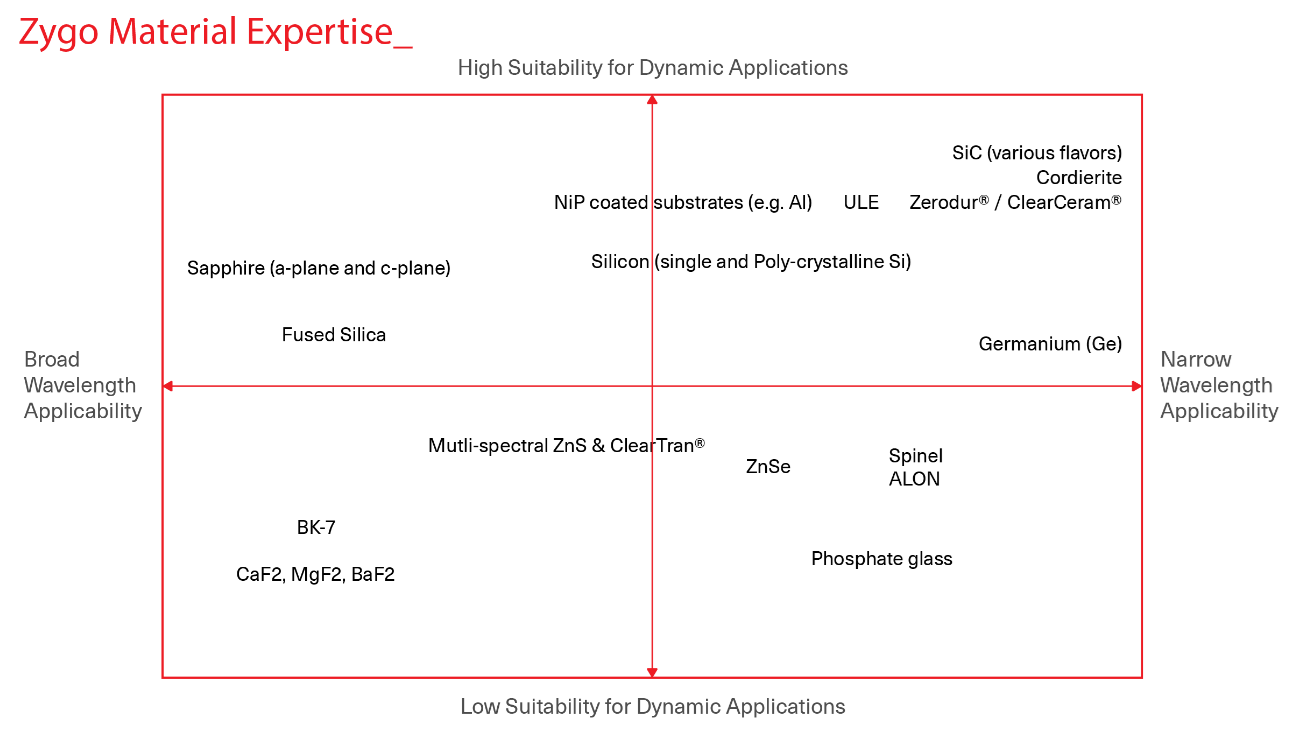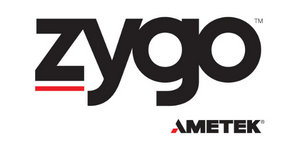Choosing the appropriate material is fundamental to preventing high-performance optical systems from cracking under pressure. The substrate used for an optical window or mirror determines the system’s optical performance, thermal stability, and durability under operational conditions.
ZygoTM, a global leader in precision optics, distinguishes itself through a material-agnostic approach, manufacturing from an exceptionally broad range of optical and non-standard materials to guarantee optimal performance for every application.
While many optical manufacturers work primarily with conventional materials such as BK7, fused silica, and various flint glasses, which are well-suited for general-purpose visible-spectrum optics, ZygoTM goes one step further.
The company processes complex, specialty crystal, and ceramic substrates that most suppliers avoid, handling them as easily as everyday materials. This is one of ZygoTM’s defining strengths and is vital for clients who require customized, high-performance solutions.
Zygo's expertise encompasses both frequently used materials and those demanding specialized knowledge and infrastructure. Materials including germanium, nickel-plated aluminum, single- and polycrystalline silicon, sapphire, and zero-expansion ceramics such as ZERODUR® and CLEARCERAM®-Z are all routinely processed at Zygo. Each material serves a distinct purpose.

Image Credit: Zygo Corporation
Infrared Materials
Germanium (Ge) is prized for its transparency in the infrared spectrum, making it well-suited for IR optics and thermal imaging systems. Nickel-plated aluminum is commonly used as a mirror substrate due to its machinability and compatibility with reflective coatings.
Silicon, available in single- or polycrystalline form, has dual functionality: It can be used in transmissive and reflective roles, particularly in telecom or high-heat applications, owing to its transparency at specific IR wavelengths and exceptional thermal conductivity.
Zinc selenide (ZnSe), recognized by its yellow hue, is another material used primarily in the infrared range. Alongside ZnS and ClearTran®, ZnSe plays a crucial role in thermal imaging systems, and Zygo has developed processes to address its particular sensitivities.
ZERODUR® and CLEARCERAM®
In semiconductor fabrication, where tolerances are measured in nanometers or even picometers, Zygo produces precision optics and mirrors made from materials such as ZERODUR® and CLEARCERAM®-Z.
These materials provide ultra-low coefficients of thermal expansion (CTE), nearly zero parts per million, ensuring dimensional stability under temperature fluctuations. This makes them well-suited for use in wafer stages and metrology frames for inspection and lithographic systems, where even half a nanometer of distortion can jeopardize process yield.
Multispectral Zinc Sulfide (ZNS) and CLEARTRAN®
In addition, Zygo handles technically demanding materials essential to aerospace, defense, and advanced scientific applications. Multispectral zinc sulfide (ZnS) and ClearTran® are standout examples, as they transmit across both the visible and infrared spectra, allowing systems with multiple sensors to operate through a single optical window, also known as a common or shared aperture.
They are commonly used in aerospace, where shared aperture can help designers achieve the weight portion of their SWaP budget (size, weight, and power) for manned and unmanned reconnaissance pods.
Calcium Fluoride, Magnesium Fluoride, and Barium Fluoride
Calcium fluoride (CaF2), magnesium fluoride (MgF2), and barium fluoride (BaF2) are crystalline materials known for their transmission from vacuum ultraviolet to the infrared spectrum. These materials are significantly difficult to process due to their softness and susceptibility to damage from thermal and mechanical shock. However, they are irreplaceable in applications requiring full-spectrum optical transparency.
Zygo's experience with these fragile materials, including their use in airborne settings, highlights the company’s sophisticated polishing and material-handling protocols.
Sapphire
Sapphire is another highly sought-after material in Zygo’s portfolio. Next to diamond in hardness, sapphire offers outstanding scratch resistance, optical clarity from UV to IR, and mechanical strength.
However, these advantages come at a cost, since sapphire is one of the most challenging materials to polish. Polishing a sapphire optic may take several times longer than polishing a fused silica component. Despite this, its durability makes it suitable for aircraft windows, sensor domes, and other exposed optical systems in harsh settings.
Cordierite
Zygo also processes advanced ceramics and hybrid materials, extending its capabilities into specialized applications. Cordierite is a ceramic material that can be engineered to match the coefficient of thermal expansion of system-critical components such as titanium or ZERODUR®.
Cordierite is formed from powder and molded before firing, enabling the creation of complex shapes and lightweight structures that would be difficult to achieve with conventional glasses or crystals. These qualities make cordierite an excellent choice for opto-mechanical systems demanding thermal compatibility and structural complexity.
Spinel and ALON
Zygo also manufactures optics from Spinel and ALON (aluminum oxynitride), ultra-hard transparent ceramics primarily employed in defense applications for conformal windows. These materials are engineered to endure ballistic impacts and explosive forces while preserving optical clarity.
The hardness of these materials rivals sapphire's, though they have some optical transmission limitations. Plus, their resistance to environmental stress makes them ideal for armored vehicle windows and protective sensor housings.
Although processing these materials is difficult, Zygo’s experience and polishing expertise guarantee reliable performance.
Silicon & Silicon Carbide
Due to its distinct mechanical characteristics, silicon carbide (SiC) has become increasingly prominent in the defense and aerospace industries. Lightweight, exceptionally stiff, and highly thermally conductive, SiC is well-suited for spaceborne optics and mirror systems.
Its composite nature allows for low-mass but highly rigid structures, capable of surviving launch stresses and performing reliably in orbit. Silicon carbide is rigid and lightweight, like carbon fiber, but in a fully ceramic form. Zygo’s ability to process and finish this material gives it a strong presence in aerospace and satellite optics.
Silicon is a similarly versatile material, available in both single- and polycrystalline forms. Like silicon carbide, it offers exceptional thermal conductivity and is ideal for high-heat settings. Silicon also has the unique optical advantage of partial infrared transparency, making it a preferred material for telecom applications as well as infrared mirrors and windows.
Zygo’s ability to process silicon and silicon carbide allows it to fulfill the precise thermal and optical demands of advanced aerospace, defense, and telecommunications systems.
Material Philosophy
Crucially, Zygo’s approach is not dictated by the ease of material construction and instead focuses on creating materials that will yield the best results for a variety of applications. In this way, they embrace true material agnosticism.
The company offers its clients unparalleled freedom to engineer optical systems by supporting a wide range of materials, including robust, chemically inert crystals, delicate fluoride substrates, IR-transparent semiconductors, and custom ceramics.
This philosophy, combined with extensive manufacturing expertise, advanced metrology, and cleanroom-level quality control, allows Zygo to produce precision optics for industries where performance, without compromise, is crucial.
Aerospace, defense, semiconductors, telecommunications, and scientific research all depend on Zygo to manufacture optics that are thermally, mechanically, and optically optimized for the environments they encounter.
Summary
In industries where precision is paramount, Zygo’s material versatility offers a strategic advantage, enabling, for example, the production of salt crystals for UV-to-IR transmission, bullet-resistant ceramics for military vehicles, and zero-CTE mirrors for photolithography.
Recognized as a trusted optical partner, Zygo is a company customers return to time and again for its unwavering commitment to quality and performance.
Acknowledgements
Produced from materials originally authored by Justin E. Turner, Division Vice-President (Optics), Zygo.

This information has been sourced, reviewed, and adapted from materials provided by Zygo Corporation.
For more information on this source, please visit Zygo Corporation.